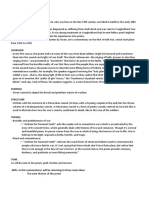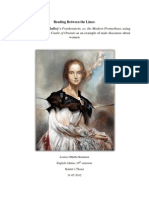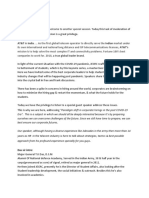Strange Meeting - Wilfred Owen
Strange Meeting - Wilfred Owen
Uploaded by
Aarti NaiduCopyright:
Available Formats
Strange Meeting - Wilfred Owen
Strange Meeting - Wilfred Owen
Uploaded by
Aarti NaiduOriginal Description:
Copyright
Available Formats
Share this document
Did you find this document useful?
Is this content inappropriate?
Copyright:
Available Formats
Strange Meeting - Wilfred Owen
Strange Meeting - Wilfred Owen
Uploaded by
Aarti NaiduCopyright:
Available Formats
In writing a poetry analysis or review of the poem "Strange Meeting" by Wilfred Owen, it is helpful to start with a summary.
A poetry essay should show a free and clear understanding of the poet's message and meaning. This poem begins with an assumption about the state of consciousness in which the speaker, perhaps a soldier, finds himself. This is brought out by the words "strange" and "it seemed." The soldier feels that he has escaped the reality of the fighting above ground by disappearing into a tunnel under the ground, only to find that the horrors there are worse than those above. At least the people up there are still alive. He finds that even under the ancient earth, there are bodies everywhere, some groaning, some already dead. The repetition of sound in the words "granite, groined and groaned" is effective in portraying images of pain and suffering.
Some "sleepers" are too fast asleep, comatose or dead to be wakened, but those who respond to the speaker's probing are worse, for they are the walking dead. More horrific still, a dead soldier responds, but appears to bless the speaker, who responds not with fear but with a reassurance that things are better down under the ground. Yet the dead soldier mourns the wasted years and the opportunities he would now never have. He talks of "the pity of war," a theme very close to Owen's heart. He despairs of a spoiled world which future generations might not bother to improve. The dead soldier appears to grieve for the good he might have done for the world, after all the lessons the bitter war had taught him about global conflict. Then, with horror, the speaker realises that it is his own act that has taken this man's bright future away - he is speaking to the soldier he killed yesterday with such concentration and determination. Yet, any "fault" is out of their hands - they were put into the arena, to fight for self-
preservation, by others. The poem ends with an invitation from the other soldier "let us sleep." We realise that the speaker too takes his turn under the ground and is perhaps dead after all.
Wilfred Salter Owen is greatly revered as an accomplished World War I poet. He was moved and motivated by the bloody and harrowing scenes of grief and suffering on the French battle lines. Owen began to see the whole concept of war as futile and absurd. He was teaching in Europe in 1914 as World War One broke. Owen enlisted in 1915 on a trip home, and was dispatched to the trench fighting in France. However during 1917 he was sent home to Edinburgh to recuperate from shell shock. There, also ill, was poet Siegfried Sassoon. The poets became friends and Sassoon became Owen's mentor. Wilfred Owen then tried out a more naturalistic style of poetry about the horrors of war, while experimenting with poetic forms. In 1918 he was sent back to the front lines in France, only to die in a German attack on 4th November. Ironically, this was only a few days before the armistice was signed.
After Owen's death, Siegfried Sassoon promoted his work and its popularity grew and became recognized for the genius it showed. Perhaps most well-known is the poem "Dulce Et Decorum Est," where Owen questions the old myth that it is sweet and fitting to die for one's country. "Strange Meeting" shows little sweetness except the belief from both sides that each had died in vain and could do little more except to lie at rest together
You might also like
- Fitness Report Writing GuideDocument16 pagesFitness Report Writing GuideNick MannweilerNo ratings yet
- Fly Away Peter LitchartDocument39 pagesFly Away Peter Litchartiamalankritgupta1No ratings yet
- World of Darkness Armory ReloadedDocument195 pagesWorld of Darkness Armory Reloadedxelif100% (35)
- The Ballad of Reading GaolDocument4 pagesThe Ballad of Reading GaolDiaNna GabelaiaNo ratings yet
- Kamikaze Vs ExposureDocument2 pagesKamikaze Vs Exposureanna.kennerleyNo ratings yet
- LitCharts War PhotographerDocument18 pagesLitCharts War PhotographerDavid100% (1)
- 111 The Adventures of Sherlock Holmes Activity Book PDFDocument25 pages111 The Adventures of Sherlock Holmes Activity Book PDFAarti Naidu50% (2)
- Futility LitChartDocument10 pagesFutility LitChartBrenden CheeNo ratings yet
- Analysis Dulce Et Decorum Est Wilfred OwenDocument2 pagesAnalysis Dulce Et Decorum Est Wilfred OwenLNo ratings yet
- Compare and Contrast Essay of "Dulce Et Decorum Est" and "Anthem For Doomed Youth"Document4 pagesCompare and Contrast Essay of "Dulce Et Decorum Est" and "Anthem For Doomed Youth"Dea HandayaniNo ratings yet
- Hymens and LipsDocument10 pagesHymens and LipsAseel IbrahimNo ratings yet
- Robert Browning Poetry AnalysisDocument7 pagesRobert Browning Poetry AnalysisManu JamesNo ratings yet
- Web Nursery RhymesDocument23 pagesWeb Nursery RhymesCar Rio BNo ratings yet
- Poetry For SoldiersDocument16 pagesPoetry For Soldiershelmuth zieglerNo ratings yet
- Anthem For Doomed YouthDocument5 pagesAnthem For Doomed YouthJayesh JainNo ratings yet
- Essay Question Futility Next WarDocument2 pagesEssay Question Futility Next Warapi-299201285100% (1)
- Strange Meeting by Wilfred OwenDocument9 pagesStrange Meeting by Wilfred Owenbritney campbellNo ratings yet
- Anthem For Doomed YouthDocument5 pagesAnthem For Doomed YouthMohsin IqbalNo ratings yet
- War PoetsDocument12 pagesWar Poetssusannamassa100% (1)
- Wilfred OwenDocument2 pagesWilfred OwenBethanyNo ratings yet
- Post Modernism in TTTCDocument5 pagesPost Modernism in TTTCapi-520774138No ratings yet
- Anthem For Doomed Youth by Wilfred OwenDocument3 pagesAnthem For Doomed Youth by Wilfred OwenJosemaria KamauNo ratings yet
- Dulce Et Decorum Est AnalysisDocument3 pagesDulce Et Decorum Est Analysisapi-222116555No ratings yet
- How Does Owen Use Form and Language in Order To Convey His Feelings About World War OneDocument3 pagesHow Does Owen Use Form and Language in Order To Convey His Feelings About World War OneKyIe ReedNo ratings yet
- FutilityDocument18 pagesFutilityapi-264330068No ratings yet
- The First World War and English PoetryDocument1 pageThe First World War and English PoetryIlie Marius AlinNo ratings yet
- 22-23-O Captain ! My Captain ! by Walt WhitmanDocument15 pages22-23-O Captain ! My Captain ! by Walt WhitmanAkshay MalviyaNo ratings yet
- Wilfred Owen - Dulce Et Decorum Est, Text of Poem and NotesDocument4 pagesWilfred Owen - Dulce Et Decorum Est, Text of Poem and NotesMalcolm J. SmithNo ratings yet
- The Author To Her Book LitChartDocument9 pagesThe Author To Her Book LitChartmajaA98No ratings yet
- Gulliver's Travels Literary Analysis - DraftDocument6 pagesGulliver's Travels Literary Analysis - Draftpianoplayer7242No ratings yet
- Handmaids Tale Personal NotesDocument14 pagesHandmaids Tale Personal NotesIsha KalyanNo ratings yet
- Wilfred OwenDocument12 pagesWilfred OwenEbrahim Mohammed AlwuraafiNo ratings yet
- Wilfred Owen Pity of WarDocument5 pagesWilfred Owen Pity of WarBrittany FarrantNo ratings yet
- Literary Theories: A Sampling of Lenses: Feminist/Gender Criticism (They Are Separate But I'm Simplifying)Document3 pagesLiterary Theories: A Sampling of Lenses: Feminist/Gender Criticism (They Are Separate But I'm Simplifying)chill21ggNo ratings yet
- Othello TimelineDocument3 pagesOthello TimelineHo LingNo ratings yet
- The Handmaid's TaleDocument6 pagesThe Handmaid's Talemegamediablog100% (1)
- Auden PoemsDocument6 pagesAuden PoemsPan DemicNo ratings yet
- Compare and Contrast Wilfred Owen's Strange Meeting' With Keith Douglas's Vergissmeinnicht'Document16 pagesCompare and Contrast Wilfred Owen's Strange Meeting' With Keith Douglas's Vergissmeinnicht'martyn3smithNo ratings yet
- What Is War Poetry - Intro PresentationDocument13 pagesWhat Is War Poetry - Intro PresentationMarcusFelsmanNo ratings yet
- The Concept of Purity in Tess D'urbervilleDocument14 pagesThe Concept of Purity in Tess D'urbervilleBianca DarieNo ratings yet
- Themes of Innocence and Experience in - Kite RunnerDocument5 pagesThemes of Innocence and Experience in - Kite RunnerDavid (Dave) MelsnessNo ratings yet
- Theatre of The AbsurdDocument5 pagesTheatre of The AbsurdAngie AlalNo ratings yet
- W.H. AudenDocument16 pagesW.H. AudenrabiaNo ratings yet
- Dulce Et Decorum Est Techniques HelpDocument24 pagesDulce Et Decorum Est Techniques Helpapi-251605269100% (1)
- Analysis of Poem Love Song...Document8 pagesAnalysis of Poem Love Song...LinaNo ratings yet
- The Elements of PoetryDocument8 pagesThe Elements of PoetryRubab ChaudharyNo ratings yet
- The Significance of War in OthelloDocument6 pagesThe Significance of War in OthelloClark ChenNo ratings yet
- Mrs. Dalloway-Fiche de LectureDocument2 pagesMrs. Dalloway-Fiche de LectureSavinataNo ratings yet
- Daphne Du Maurier and The Perils of PassingDocument6 pagesDaphne Du Maurier and The Perils of Passingcarolyn6302100% (1)
- TTTC-Chapters 2-4 QuestionsDocument3 pagesTTTC-Chapters 2-4 QuestionsJaila Palmer [STUDENT]No ratings yet
- The Things They Carried EssayDocument5 pagesThe Things They Carried Essayapi-332142656No ratings yet
- War ImageryDocument3 pagesWar ImagerycristinamortesNo ratings yet
- O What Is That SoundDocument4 pagesO What Is That SoundMuhammad Tayyab Ahmad100% (1)
- Frankenstein ThesisDocument77 pagesFrankenstein Thesisapi-283549718No ratings yet
- Critical Appreciation of The Poem After BlenheimDocument7 pagesCritical Appreciation of The Poem After BlenheimEmilda SaraNo ratings yet
- The Things They Carried by Tim O'Brien - Discussion QuestionsDocument3 pagesThe Things They Carried by Tim O'Brien - Discussion QuestionsHoughton Mifflin HarcourtNo ratings yet
- Anthem For Doomed Youth - WILFRED OWENDocument18 pagesAnthem For Doomed Youth - WILFRED OWENirynNo ratings yet
- Analysis of Dorian GreyDocument2 pagesAnalysis of Dorian GreyАйназик ЖолдошеваNo ratings yet
- Extended EssayDocument15 pagesExtended EssayAntonella DelAguilaNo ratings yet
- English Essay - Wilfred Owen Text AnalysisDocument1 pageEnglish Essay - Wilfred Owen Text AnalysisAvery Truong0% (1)
- The Narrative of Frederick DouglassDocument34 pagesThe Narrative of Frederick DouglassYashrajNo ratings yet
- The Second Coming Critical EssaysDocument3 pagesThe Second Coming Critical EssaysArindam SenNo ratings yet
- Greek Mythology in Yeats' PoetryDocument3 pagesGreek Mythology in Yeats' PoetryTanvi Kapoor100% (4)
- InvoiceDocument3 pagesInvoiceAarti NaiduNo ratings yet
- Presentation 1: Aarti A10101CCN6009Document6 pagesPresentation 1: Aarti A10101CCN6009Aarti NaiduNo ratings yet
- ES-332 (1) Dec-2012Document4 pagesES-332 (1) Dec-2012Aarti NaiduNo ratings yet
- The Soldier by Rupert BrookeDocument1 pageThe Soldier by Rupert BrookeAarti Naidu100% (1)
- Children's Development of Math Concepts - Ages 4-6Document4 pagesChildren's Development of Math Concepts - Ages 4-6Aarti NaiduNo ratings yet
- India Literature Silence! The Court Is in Session by Vijay TendulkarDocument23 pagesIndia Literature Silence! The Court Is in Session by Vijay TendulkarAarti Naidu67% (3)
- B.Ed. 2011Document52 pagesB.Ed. 2011Srini KumarNo ratings yet
- British Parliamentary Reform in The 19th CenturyDocument10 pagesBritish Parliamentary Reform in The 19th CenturyAarti Naidu100% (2)
- Maths For Labels and CountingDocument4 pagesMaths For Labels and CountingAarti NaiduNo ratings yet
- SymphonyIII - 9.1 - Brahma by Ralph Waldo EmersonDocument2 pagesSymphonyIII - 9.1 - Brahma by Ralph Waldo EmersonAarti NaiduNo ratings yet
- John and The Bean StalkDocument2 pagesJohn and The Bean StalkAarti NaiduNo ratings yet
- Community Helpers RhymesDocument10 pagesCommunity Helpers RhymesAarti NaiduNo ratings yet
- Three Little PigsDocument2 pagesThree Little PigsAarti NaiduNo ratings yet
- Don'T Forget! When To Test CourageDocument1 pageDon'T Forget! When To Test CourageNaiara Reyes MarreroNo ratings yet
- Insights To TTP - SOPDocument27 pagesInsights To TTP - SOPЮрийNo ratings yet
- Sinteze. Matematica 3 Geometrie Si Trigonometrie - Felicia SandulescuDocument2 pagesSinteze. Matematica 3 Geometrie Si Trigonometrie - Felicia SandulescuIrina CNo ratings yet
- Dacian WarsDocument30 pagesDacian WarsHans MarinoNo ratings yet
- The Wretched of The Earth LitChartDocument47 pagesThe Wretched of The Earth LitChartMODDASIR BHUIYAN MAHINo ratings yet
- Readings in Philippine HistoryDocument36 pagesReadings in Philippine HistoryJasmine PimentelNo ratings yet
- SNNAIDocument21 pagesSNNAICristine Manahan De TorresNo ratings yet
- Tales of High Adventure Sword & Sorcery in The Forbidden LandsDocument13 pagesTales of High Adventure Sword & Sorcery in The Forbidden LandsSimon LitalienNo ratings yet
- Unholy AlliancesDocument327 pagesUnholy AlliancesCharly SPXINo ratings yet
- Tactical Muzzle Velocity Radars: Why A Muzzle Velocity Radar? Meet The Mvrs-700 FamilyDocument2 pagesTactical Muzzle Velocity Radars: Why A Muzzle Velocity Radar? Meet The Mvrs-700 Familyait oubella marouaneNo ratings yet
- Ant Role Best Row 2nd Best 3rd Best Rating (5 The Best / 1 The Lowest)Document5 pagesAnt Role Best Row 2nd Best 3rd Best Rating (5 The Best / 1 The Lowest)JhayR GarciaNo ratings yet
- (Conway Maritime Press) (Anatomy of The Ship) The Battleship WarspiteDocument122 pages(Conway Maritime Press) (Anatomy of The Ship) The Battleship Warspitezkarlos100% (7)
- TrialDocument5 pagesTrialSicat Mark BantiyanNo ratings yet
- THAKURGAON AREA DB Wise Target Format Dec'20Document14 pagesTHAKURGAON AREA DB Wise Target Format Dec'20Mohammad Tanvir Hayder EhsaanNo ratings yet
- BB 55 Theater Air DefenseDocument5 pagesBB 55 Theater Air DefenseRiksawan ArdhiantoNo ratings yet
- The Interpretation and Implementation of Peace AgreementsDocument26 pagesThe Interpretation and Implementation of Peace AgreementsAbrîl VGNo ratings yet
- TaylorDocument63 pagesTaylorjaguarsp1No ratings yet
- Priyanka Mam ScriptDocument2 pagesPriyanka Mam ScriptKushal SainNo ratings yet
- Goals EssayDocument2 pagesGoals Essayapi-532051698No ratings yet
- Nurzal Minir KTADocument3 pagesNurzal Minir KTAjum MaidiNo ratings yet
- TERRORISMDocument5 pagesTERRORISMDavid PachuauNo ratings yet
- 12th Tamil Unit 5 Surya GuideDocument42 pages12th Tamil Unit 5 Surya Guideapi-61969455750% (2)
- History and Legal Status of GB and AJK 12032023 071407pmDocument10 pagesHistory and Legal Status of GB and AJK 12032023 071407pmMeer SalarNo ratings yet
- Lagman V MedialdeaDocument49 pagesLagman V MedialdeaChingNo ratings yet
- Chapter 39Document164 pagesChapter 39captmahbubbn5838No ratings yet
- Reiteration Re Submission of Immediate and Progress Development Special Written Reports On Incidents Involving CTG and LTGDocument2 pagesReiteration Re Submission of Immediate and Progress Development Special Written Reports On Incidents Involving CTG and LTGintelbasistampsNo ratings yet
- KoW Start Collecting Twilight Kin A5 Booklet DIGITALDocument12 pagesKoW Start Collecting Twilight Kin A5 Booklet DIGITALClodomir le MyrNo ratings yet
- DR Aye Aye San (825-851)Document27 pagesDR Aye Aye San (825-851)Zaw Moe AungNo ratings yet








































































































